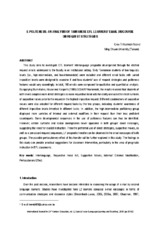E-politeness: an analysis of taiwanese efl learners’ email discourse on request strategies
Autor
Heather Tseng, Chia-Ti
Editor
Universidad de Córdoba, UCOPressFecha
2016Materia
InterlanguageRequestive head act
Supportive moves
Internal/ external modification
Perlocutionary effect
METS:
Mostrar el registro METSPREMIS:
Mostrar el registro PREMISMetadatos
Mostrar el registro completo del ítemResumen
This study aims to investigate EFL learners’ interlanguage pragmatic development through the elicited
request emails addressed to the faculty in an institutional setting. Sixty Taiwanese students of two linguistic
levels (i.e., high-intermediate, and low-intermediate) were included and different email tasks with varied
imposition levels were designed to examine if and how students’ use of request strategies and politeness
features would vary accordingly. In total, 180 emails were composed for qualitative and quantitative analysis.
By applying Blum-Kulka, House and Kasper’s (1989) CCSARP framework, the results revealed that students of
both levels adopted more direct strategies as main requestive head acts for clarity and used the most numbers
of supportive moves prior to the request in the highest imposition request. Different combinations of supportive
moves were also adopted for different request tasks by the two groups, indicating students’ awareness of
different imposition levels inherited in different tasks. In addition, the high-intermediate proficiency group
displayed more varieties of internal and external modifiers in their request than their less proficient
counterparts. Some developmental sequences in the use of politeness features can thus be identified.
However, certain syntactic and lexical downgraders never appeared in both groups’ email messages,
suggesting the need for explicit instruction. From the preferred use of direct strategies, supportive moves, as
well as a pre-posed request sequences, L1 pragmatic transfer can be observed in the email messages of both
groups. The possible perlocutionary effect of this transfer will be further explored in this study. The findings in
this study can provide practical suggestions for classroom intervention, particularly in the area of pragmatic
instruction in EFL classrooms.

